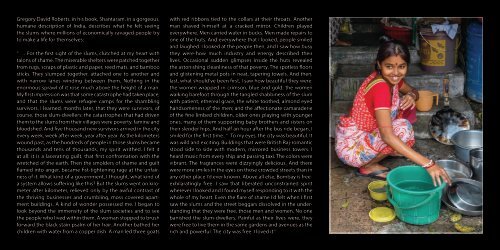KOLKATA SLUMS
Create successful ePaper yourself
Turn your PDF publications into a flip-book with our unique Google optimized e-Paper software.
Gregory David Roberts, in his book, Shantaram, in a gorgeous,<br />
humane description of India, describes what he felt seeing<br />
the slums where millions of economically-ravaged people try<br />
to make a life for themselves:<br />
“ … For the first sight of the slums, clutched at my heart with<br />
talons of shame. The miserable shelters were patched together<br />
from rugs, scraps of plastic and paper, reed mats, and bamboo<br />
sticks. They slumped together, attached one to another and<br />
with narrow lanes winding between them. Nothing in the<br />
enormous sprawl of it rose much above the height of a man.<br />
My first impression was that some catastrophe had taken place,<br />
and that the slums were refugee camps for the shambling<br />
survivors. I learned, months later, that they were survivors, of<br />
course, those slum-dwellers: the catastrophes that had driven<br />
them to the slums from their villages were poverty, famine and<br />
bloodshed. And five thousand new survivors arrived in the city<br />
every week, week after week, year after year. As the kilometers<br />
wound past, as the hundreds of people in those slums became<br />
thousands and tens of thousands, my spirit writhed. I felt it<br />
at all; it is a lacerating guilt, that first confrontation with the<br />
wretched of the earth. Then the smolders of shame and guilt<br />
flamed into anger, became fist-tightening rage at the unfairness<br />
of it: What kind of a government, I thought, what kind of<br />
a system allows suffering like this? But the slums went on kilometer<br />
after kilometer, relieved only by the awful contrast of<br />
the thriving businesses and crumbling, moss covered apartment<br />
buildings. A kind of wonder possessed me. I began to<br />
look beyond the immensity of the slum societies and to see<br />
the people who lived within them. A woman stopped to brush<br />
forward the black stain psalm of her hair. Another bathed her<br />
children with water from a copper dish. A man led three goats<br />
with red ribbons tied to the collars at their throats. Another<br />
man shaved himself at a cracked mirror. Children played<br />
everywhere. Men carried water in bucks. Men made repairs to<br />
one of the huts. And everywhere that I looked, people smiled<br />
and laughed. I looked at the people then, and I saw how busy<br />
they were-how much industry and energy described their<br />
lives. Occasional sudden glimpses inside the huts revealed<br />
the astonishing cleanliness of that poverty. The spotless floors<br />
and glistening metal pots in neat, tapering towels. And then,<br />
last, what should’ve been first, I saw how beautiful they were:<br />
the women wrapped in crimson, blue and gold; the women<br />
walking barefoot through the tangled shabbiness of the slum<br />
with patient, ethereal grace, the white toothed, almond eyed<br />
handsomeness of the men; and the affectionate camaraderie<br />
of the fine limbed children, older ones playing with younger<br />
ones, many of them supporting baby brothers and sisters on<br />
their slender hips. And half an hour after the bus ride began, I<br />
smiled for the first time...” To my eyes, the city was beautiful. It<br />
was wild and exciting. Buildings that were British Raj-romantic<br />
stood side to side with modern, mirrored business towers. I<br />
heard music from every ship and passing taxi. The colors were<br />
vibrant. The fragrances were dizzyingly delicious. And there<br />
were more smiles in the eyes on those crowded streets than in<br />
any other place I’d ever known. Above all else, Bombay is freeexhilaratingly<br />
free. I saw that liberated unconstrained spirit<br />
wherever I looked and I found myself responding to it with the<br />
whole of my heart. Even the flare of shame I’d felt when I first<br />
saw the slums and the street beggars dissolved in the understanding<br />
that they were free, those men and women. No one<br />
banished the slum-dwellers. Painful as their lives were, they<br />
were free to live them in the same gardens and avenues as the<br />
rich and powerful. The city was free. I loved it.”

















